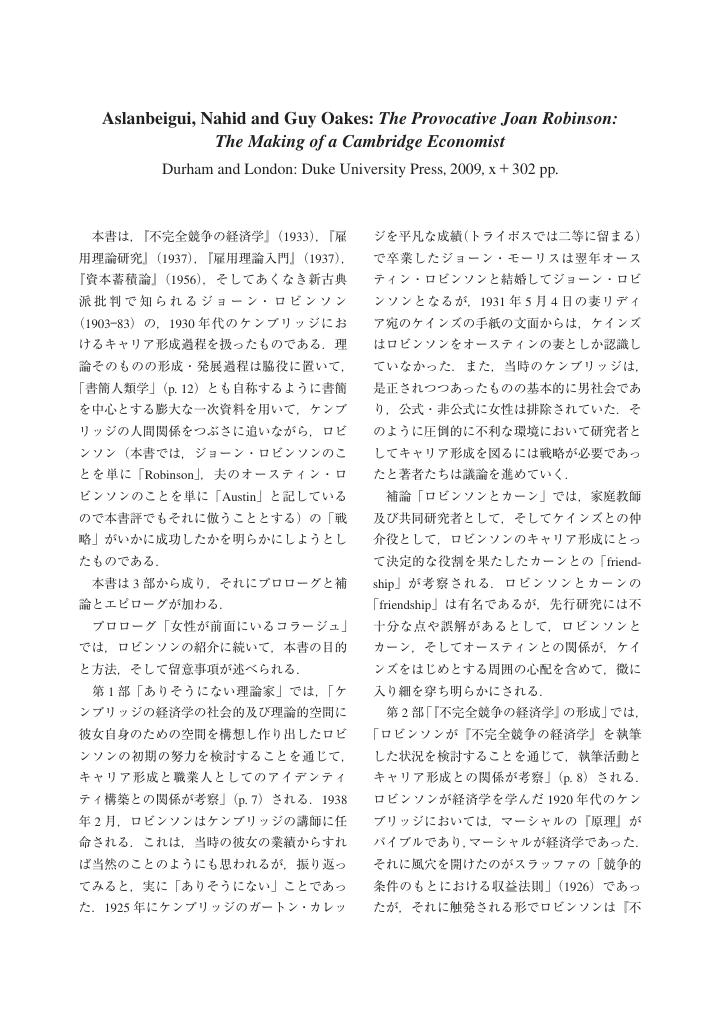8 0 0 0 OA 『カレツキの政治経済学』再論(<特集>カレツキ経済学の現代的評価)
- 著者
- 山本 英司
- 出版者
- 経済理論学会
- 雑誌
- 季刊経済理論 (ISSN:18825184)
- 巻号頁・発行日
- vol.47, no.4, pp.42-52, 2011-01-20 (Released:2017-04-25)
This article reargues my book, Kalecki's Politic l Economy, which was published in 2009 and a revised version of my doctoral dissertation submitted to Kyoto University in 2003. The book was reviewed at two academic meetings and two book reviews were published. Replying to them, this article summarizes the gist of my book and corrects some errors if necessary. My book consists of eight chapters. Apart from chapter 1 of "introduction of Kalecki," it may be divided into three parts: Kalecki's studies in capitalist economies, Kalecki's comparative economic studies, and Kalecki as a "Marxist." First, this article examines Kalecki's biographical problems. Kalecki's life may be divided into three parts: from his birth in 1899 until his leaving Poland in 1936, his exile days until his returning home in late 1954 or early 1955, and the rest of his life until his death in 1970. Although my book mainly used Kalecki's chronological personal history by Osiatynski in Collected Works of Michal Kalecki, it has been found not to be necessarily correct. So this article describes the true story as possible. Second, this article examines Kalecki's studies in capitalist economies, focusing Essay on the Business Cycle Theory (1933) in particular. Essay is very famous as the evidence of Kalecki's priority over Keynes's General Theory (1936). But it was written in Polish, and has been known through a shortened English version, which has led to rather limited understanding of the work. The publication of the English version of Collected Works of Michal Kalecki enabled the detailed examination of the full version of Essay. Here is the result. Third, this article examines Kalecki's comparative economic studies. Kalecki studied socialist and developing economies as well as capitalist economies. This article presents a perspective from which those three economic systems should be viewd. In addition to that, Kalecki's version of "the presuppositions of Harvey Road" is mentioned. Forth, this article examines Kalecki as a "Marxist." Although a lot of comparative studies on him with Keynes have been presented, ones with Marx were relatively rare. Kalecki had never been a member of the communist party, nor an orthodox and dogmatic Marxist. Nevertheless, this article tries to describe Kalecki as a Marxist in a sense, and claims that his interpretation of historical materialism enabled his non-dogmatic and realistic analysis of the transformation of capitalism. Finally, remaining themes are considered. I am going to pay attention to Post-Keynesian ecoomics, especially Kaleckian macroeconomics. I must admit that application to modern economy should not be forgotten.
1 0 0 0 OA 「根本的な改革」から「決定的な改革」へ ―カレツキにおける史的唯物論―
- 著者
- 山本 英司
- 出版者
- 京都大學經濟學會
- 雑誌
- 經濟論叢 (ISSN:00130273)
- 巻号頁・発行日
- vol.167, no.1, pp.57-72, 2001-01
1 0 0 0 IR 「根本的な改革」から「決定的な改革」へ--カレツキにおける史的唯物論
- 著者
- 山本 英司
- 出版者
- 京都大學經濟學會
- 雑誌
- 経済論叢 (ISSN:00130273)
- 巻号頁・発行日
- vol.167, no.1, pp.57-72, 2001-01
- 著者
- 山本 英司
- 出版者
- 経済学史学会
- 雑誌
- 経済学史研究 (ISSN:18803164)
- 巻号頁・発行日
- vol.52, no.2, pp.141-142, 2011 (Released:2019-10-28)
1 0 0 0 OA 新古典派経済学の哲学的源流
- 著者
- 山本 英司
- 出版者
- The Japanese Society for the History of Economic Thought
- 雑誌
- 経済学史学会年報 (ISSN:04534786)
- 巻号頁・発行日
- vol.37, no.37, pp.70-81, 1999 (Released:2010-08-05)
- 参考文献数
- 27
Much criticism has been levied against Neo-Classical Economics (NCE). Currently, even the followers of NCE have declared the need for alternative economics.This paper examines the philosophical origins of NCE. In the process of making this examination, we establish a fundamental critique against NCE, which has survived through the ‘evolutionary’ process.This paper points out the philosophical origins of NCE. First, the theoretical aspect of NCE (that is, methodological individualism), originated in Descartes. ‘Homo Economicus’ (rational economic man) and the optimum principle are derived from Descartes. Notably, the logic of Descartes ultimately depends on the proof of the existence of God. This appropriation is scandalous, in that it throws into question the very rationality of Descartes' and Neo-Classical Economics' foundations. Second, the empirical aspect (i. e., falsificationism) originated in Popper. This appropriation gave the economics a scientific aspect, insist the followers of NCE. Although Kuhn's ‘Scientific Revolutions Theory’ and ‘Paradigm Theory’ challenged falsificationism, Popper's pupil Lakatos modified Popper's theory and advocated ‘Methodology of Scientific Research Programmes’ (MSRP). In turn, this modification made falsificationism seem innocuous.This paper ends with suggestions for alternative economics, referenced with irony from Descartes and Popper: Popper's original bold trials and errors (viz., conjectures and refutations), and Descartes' ‘temporary morality’.
1 0 0 0 OA フィールドにおける生命現象の解明とその制御に向けた基盤技術の創出
1 0 0 0 OA 「マルクス主義者」としてのカレツキ
- 著者
- 山本 英司 Eiji Yamamoto 奈良産業大学経済学部
- 雑誌
- 奈良産業大学産業と経済 = Nara Sangyo University, the journal of industrial economics (ISSN:09159789)
- 巻号頁・発行日
- vol.20, no.3, pp.123-146, 2005-09-30
1 0 0 0 IR カレツキと階級闘争
- 著者
- 山本 英司
- 出版者
- 奈良産業大学社会科学学会
- 雑誌
- 社会科学雑誌 = The Journal of Social Science (ISSN:18837778)
- 巻号頁・発行日
- vol.5, pp.575-602, 2012-11-30

